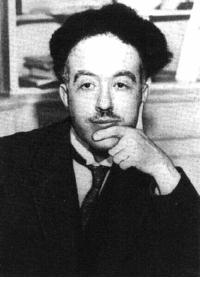Louis-Victor-Pierre-Raymond 7e duc de Broglie
Physicist, b. 15 August 1892 (Dieppe, France), d. 19 March 1987 (Paris)
 The family of the de Broglies belonged to the French aristocracy and had delivered soldiers, politicians and diplomats for France's ruling houses since the 17th century. Louis-Victor was also destined for the diplomatic service and initially studied history. his interest in physics was developed through contact with his brother Maurice, who had already broken with family tradition, built himself a physics laboratory in the family mansion and started experiments in nuclear physics. But Louis-Victor's interest was not in experiment; in his own words he preferred "the state of mind of a pure theoretician than that of an experimenter or engineer, loving especially the general and philosophical view."
The family of the de Broglies belonged to the French aristocracy and had delivered soldiers, politicians and diplomats for France's ruling houses since the 17th century. Louis-Victor was also destined for the diplomatic service and initially studied history. his interest in physics was developed through contact with his brother Maurice, who had already broken with family tradition, built himself a physics laboratory in the family mansion and started experiments in nuclear physics. But Louis-Victor's interest was not in experiment; in his own words he preferred "the state of mind of a pure theoretician than that of an experimenter or engineer, loving especially the general and philosophical view."
The decision to leave history behind and embark on the study of atoms was a lengthy struggle, but in 1924 Broglie delivered his thesis on electron waves. It contained a model of the atom in which the principle of the duality of light as wave and particle stream was extended to the very building blocks of matter. Broglie proposed that electrons also had the properties of waves.
In 1924 Broglie's idea appeared pure speculation. Experiments indicated that electrons move around a nucleus and cannot do that in any random way but prefer certain states of motion. But why that was so remained obscure, and no experiment or observation was known to suggest that electrons behaved like waves.
Broglie's publication was not widely read or understood but fell into the right hands. Einstein accepted the idea with enthusiasm, and Erwin Schrödinger developed the theory of wave mechanics from it.
Broglie was appointed Professor of Theoretical Physics at the newly formed Henri Poincaré Institute in 1928 and remainded in that position until he retired in 1962. After World War II he became an adviser of the French Atomic Energy Commissariat. He won the Nobel Prize in physics and the Kalinga Prize of the United Nations Economic and Social Council for his popularization of physics in writings for the general public.
Broglie continued his interest in philosophy and in particular the philosophical implications of modern science.
Photo: public domain (Wikipedia)
home
 The family of the de Broglies belonged to the French aristocracy and had delivered soldiers, politicians and diplomats for France's ruling houses since the 17th century. Louis-Victor was also destined for the diplomatic service and initially studied history. his interest in physics was developed through contact with his brother Maurice, who had already broken with family tradition, built himself a physics laboratory in the family mansion and started experiments in nuclear physics. But Louis-Victor's interest was not in experiment; in his own words he preferred "the state of mind of a pure theoretician than that of an experimenter or engineer, loving especially the general and philosophical view."
The family of the de Broglies belonged to the French aristocracy and had delivered soldiers, politicians and diplomats for France's ruling houses since the 17th century. Louis-Victor was also destined for the diplomatic service and initially studied history. his interest in physics was developed through contact with his brother Maurice, who had already broken with family tradition, built himself a physics laboratory in the family mansion and started experiments in nuclear physics. But Louis-Victor's interest was not in experiment; in his own words he preferred "the state of mind of a pure theoretician than that of an experimenter or engineer, loving especially the general and philosophical view."